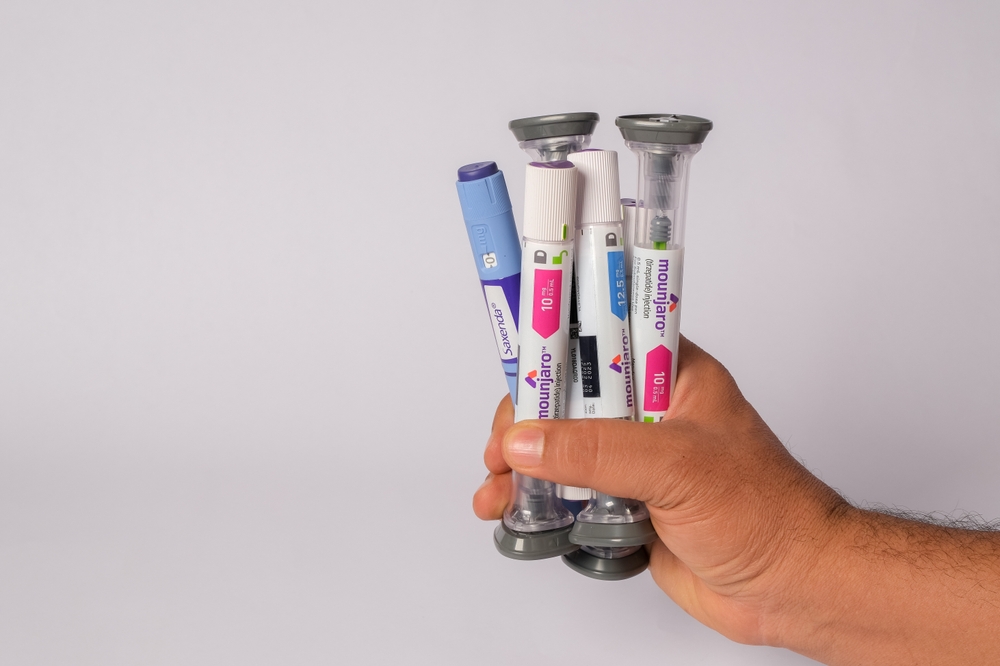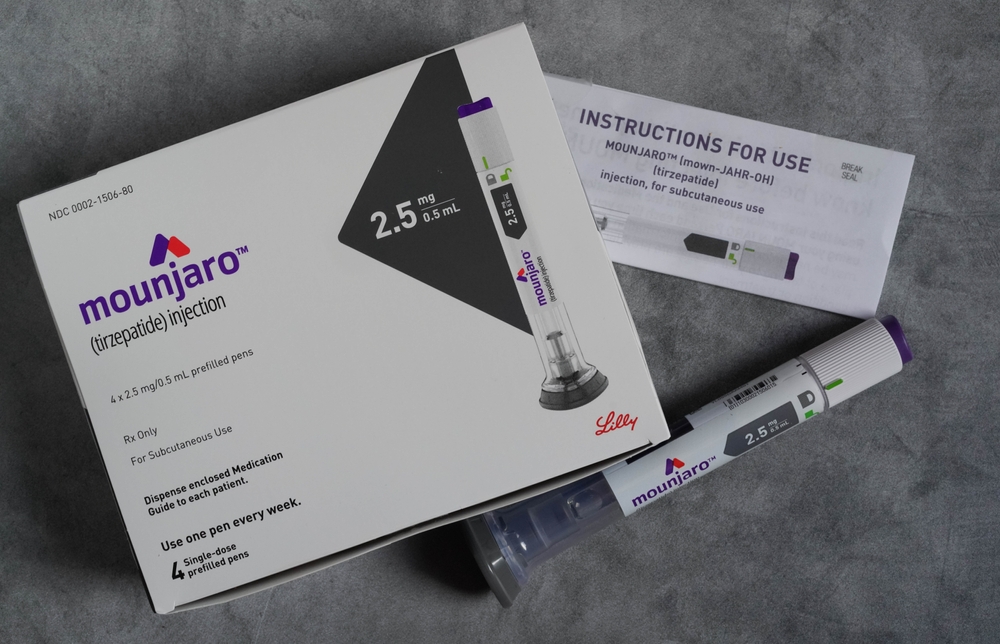Prescription weight loss treatment is more common now than ever before, which is a massive step in the right direction in handling the obesity epidemic. Weight loss pills and weight loss injections make up many of the treatments offered to patients today. But how do the two approaches differ in terms of efficacy, mechanisms, administration, side effects and costs?
This blog will compare weight loss injections and pills, so you can feel more confident, whatever route you choose to take in handling your own health.
Note: This blog should not be considered a replacement for professional medical consultation.
What are weight loss injections and how do they work?
The main weight loss injections are either GLP-1 receptor agonists or dual GLP-1/GIP receptor agonists. All of them replicate human hormone responses, helping the body to regulate blood sugar and feel fuller for longer, aiding weight loss efforts. Examples include:
These three injections are all taken weekly and can also be used as part of a plan to manage type 2 diabetes – Ozempic is specifically for this condition. There’s also an older drug called Saxenda (liraglutide); however, it’s not that common anymore.
By mimicking gut hormones, these medicines slow gastric emptying and enhance satiety signals. That helps reduce overall calorie intake and stabilise insulin response, which in turn supports losing weight and maintaining a healthy weight over time. For many people, that also means addressing weight-related health conditions such as high blood pressure and heart disease. People at higher risk of complications (family history, BMI or other risk factors) may particularly benefit from this dual impact on blood sugar and appetite for weight management.
How they’re taken. Most GLP-1 or dual-agonist weight loss injections come in single-use or multi-use pens with needles. They’re typically self-administered into the abdomen or thigh once a week on the same day each week. Many patients find the weekly cadence easier to remember than daily tablets. Healthcare teams typically begin with a lower dose and titrate upward to determine the optimal quantity.
Common side effects. You may experience nausea, bloating, constipation, diarrhoea or abdominal pain early on. Low blood sugar (hypoglycaemia) is uncommon when these drugs are used alone, but your risk can increase if you’re also on insulin or sulfonylureas. Some people report headaches, dizziness or fatigue. Always follow your clinician’s guidance on dose increases, hydration and what to do if you feel unwell.
Pros of weight loss injections
- Frequently deliver greater average reductions in body weight than tablets, especially for people who need more than modest loss.
- Once-weekly dosing can be easier to remember than taking multiple daily tablets, which supports consistent adherence.
- Potential health benefits beyond weight loss, including improved glycaemic control and cardiometabolic markers, which can reduce long-term risks of heart disease.
Cons of weight loss injections
- Needle aversion, as in some people simply prefer not to inject.
- Side effects (nausea, abdominal pain) can be more noticeable during dose titration; low blood sugar risk rises if combined with certain diabetes medicines.
- Eligibility may be assessed using criteria from the UK’s National Institute for Health and Care Excellence (NICE) — sometimes referred to as “health and care excellence” guidance — and availability can vary.
- Practical tasks like pen storage, travel and disposal of sharps need planning, which isn’t suitable for everyone due to specific medical histories or risk factors.
What are weight loss pills and how do they work?
When it comes to the best fat-reducing pills, the jury is out on which chemical format is the most consistently effective.
One common form is the lipase inhibitor, such as Orlistat (Xenical or Alli). This drug targets lipase enzymes, reducing fat absorption and digestion. Undigested fat is excreted, reducing calories taken up by the body.
You can also get Contrave, a combination of naltrexone and bupropion, formulated to affect appetite and reward centres in the brain. You can also get oral semaglutide, primarily for type 2 diabetes, but it often leads to weight loss when used as part of a wider programme.
How they’re taken. Tablets are typically taken once to three times daily, depending on the medicine. Some (like Orlistat) need to be taken with meals containing fat to work correctly. Adherence depends on remembering doses throughout the day, which some find easy and others find harder than a once-weekly injection.
Common side effects. Orlistat may cause oily stools, urgency, flatulence and gastrointestinal cramps. Centrally acting agents can cause headaches, insomnia or changes in mental health such as low mood or irritability in some people. As always, your prescriber will weigh up benefits and risks based on your history.
Pros of weight loss pills
- No needles, making them familiar and convenient for those who prefer tablets.
- Often more affordable than injections, with generic weight loss tablets available in some cases.
- Easier to start and stop and no injection training required.
- Useful for people who want a gentler first step before considering injectables.
Cons of weight loss pills
- Require daily commitment; missing doses can reduce effectiveness.
- Average weight loss is often smaller versus injectables.
- Gastrointestinal side effects are common with lipase inhibitors; other pills may affect sleep or mental health.
- Some options interact with existing medicines; careful review of risk factors and history is essential.
Weight loss pills vs injections – which is better?
If you’re thinking about the battle of Orlistat vs Mounjaro (or another equivalent), it’s hard to pin down a simple “better” option. You need to consider a variety of factors.
Goals
If you’re looking to lose as much weight as possible, weight loss injectables have shown the most significant results across clinical trials. For people seeking more modest changes or a stepwise approach, weight loss tablets may be enough to kick-start progress and build confidence.
Preferred administering method
If you’re afraid of or strongly dislike injections, taking an oral pill will be much easier. On the other hand, daily memory can be harder to maintain than a weekly shot for some. Think practically; which routine will you stick to without stress?
Cost
Oral medications are generally more affordable and readily available in generic forms. Injections are usually more expensive and may require meeting specific eligibility criteria. If cost is a deciding factor, tablets can be a starting point while you implement healthy lifestyle changes.
Side effect tolerance
Every medication has its own set of potential side effects, so consider those and your tolerance to them carefully. Some people prefer the predictable GI effects of Orlistat to the nausea sometimes seen with GLP-1s; others feel the opposite. Discuss what’s acceptable for you and remember that dose-titration schedules exist to help you find a balance.
Comorbidities
If you already live with something like type 2 diabetes or cardiovascular issues, semaglutide injections can be more suitable than pills. People with weight-related health conditions (e.g., high blood pressure) may be offered injectables sooner because of potential cardiometabolic health benefits.
Which Is Easier to Use – Pills or Injections?
Ease of use depends entirely on personal preference. Some find swallowing a daily pill effortless, while others prefer the convenience of a weekly injection.
Consider your routine. If you travel frequently or have irregular meal times, a weekly injection could be simpler. If you like building habits into your day, pills might be ideal. Either way, don’t forget practicalities like pen storage, sharps disposal and reminders on your phone.
For many, injections feel like a bigger step, but once they’re used to the process, the simplicity of a single weekly dose often outweighs the hassle of remembering tablets every day. Others prefer the familiarity of tablets and the ability to stop and start easily under medical supervision.
Why lifestyle changes still matter in weight loss
Neither weight loss injections nor pills are a magic fix. The best results come when medication is combined with healthy lifestyle changes. That means:
- Following a balanced diet with plenty of fruit, vegetables, wholegrains and lean protein to increase satiety.
- Building regular exercise into your week, from brisk walks and resistance training to swimming or cycling.
- Prioritising sleep and stress management, both of which influence hunger hormones and emotional eating patterns.
- Staying hydrated and mindful of alcohol intake, since liquid calories stack up quickly.
Think of medication as a tool to help you on your weight loss journey, but not a replacement for healthier living. Ultimately, losing weight sustainably requires addressing lifestyle and risk factors in the long term. People who set realistic targets, review progress with their clinician and adapt their healthy diet and activity plan tend to maintain a healthy weight more effectively.
Who should consider pills vs injections?
- Pills may suit those with a lower budget, a dislike of needles or those who want a convenient, accessible option to support weight loss without weekly injections. They can be effective if you commit to daily dosing and meal-time routines.
- Injections may suit people with a higher BMI, those living with diabetes or anyone who needs more powerful tools to address weight-related health conditions. If appetite is the main challenge or you’ve plateaued on tablets, injectables can provide the required push.
Your clinician will weigh up benefits, risk factors, current medications and personal preference. They’ll also check whether you meet the relevant criteria suggested by Health and Care Excellence guidance in the UK.
Conclusion
At the end of the day, there’s no right or wrong answer about whether weight loss pills vs injections are “better”. It all depends entirely on each individual, their goals and, most importantly, what their doctor advises them to use.
Book an appointment with your doctor today if it’s time to take the next steps in your fitness journey. And check out our blog page for a helping hand along the way, with a wealth of similar informational articles.
Ultimately, the decision should be made in close consultation with a doctor who can assess your medical history, current health status, weight loss goals and preferences to determine the safest and most effective weight loss medication for you.
Frequently Asked Questions
Which is more effective for weight loss – pills or injections?
Across many programmes, injectables often deliver greater average reductions in body weight than tablets, particularly when adherence is strong and lifestyle measures are in place. That doesn’t mean tablets don’t work, but if your target is ambitious or you’ve struggled to lose enough with weight loss tablets, injectables may be the next logical step.
Can I buy weight loss injections without a prescription in the UK?
No. Weight loss injections are prescription-only. Access typically follows guidance from the National Institute for Health and Care Excellence (NICE), with clinicians considering BMI, weight-related health conditions and risk factors before prescribing. This ensures safe and appropriate use, as well as ongoing monitoring over time.
What are the side effects of weight loss pills?
It depends on the medication. Orlistat (a lipase inhibitor) can cause oily stools, urgency and abdominal pain due to reduced fat absorption. Centrally acting agents may affect sleep or mood/mental health. Your prescriber will discuss what to expect, how to minimise side effects and when to seek advice.
Are weight loss injections only for people with diabetes?
No. While initially developed to help manage blood sugar in type 2 diabetes, medications like semaglutide and tirzepatide are also used for weight management in people without diabetes when appropriate.
How long does it take to see results with weight loss injections?
Most people begin to notice changes within the first 8–12 weeks as doses are titrated. Your care team will review progress and adjust your plan so results are steady and sustainable rather than rapid weight loss that’s hard to maintain. Maintaining an otherwise healthy lifestyle is essential.














